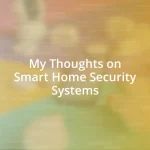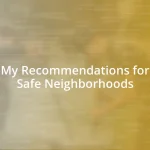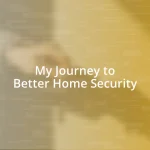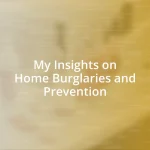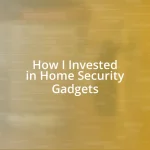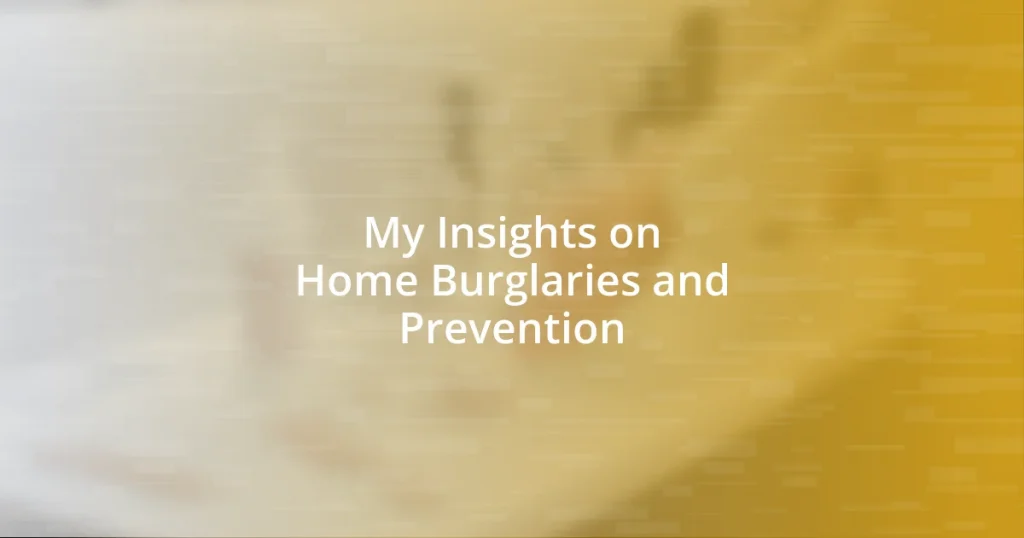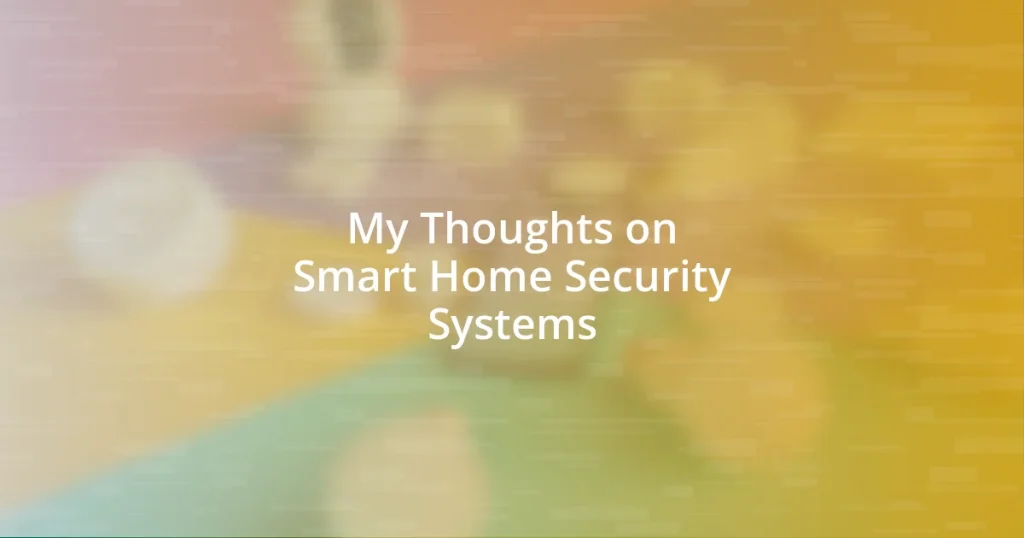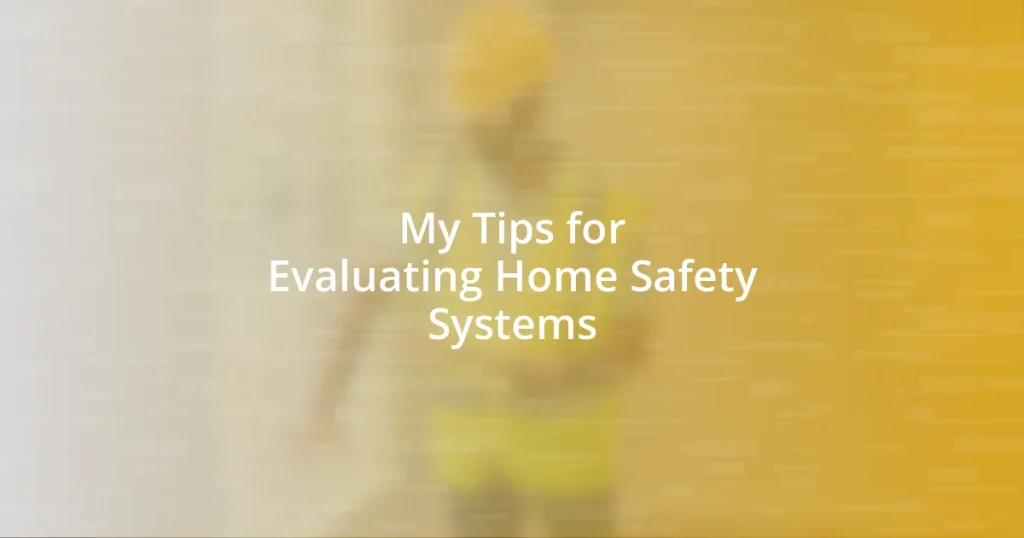Key takeaways:
- Burglaries often target homes that appear vacant or uninviting; simple proactive measures such as maintaining a well-kept yard and using security systems can deter intruders.
- Common vulnerabilities include unlocked doors/windows, visible valuables, and poor lighting, which can be mitigated through increased awareness and security measures like locks and smart technology.
- Participation in Neighborhood Watch programs enhances community safety and fosters connections, while comprehensive home insurance provides essential financial protection and peace of mind against losses.
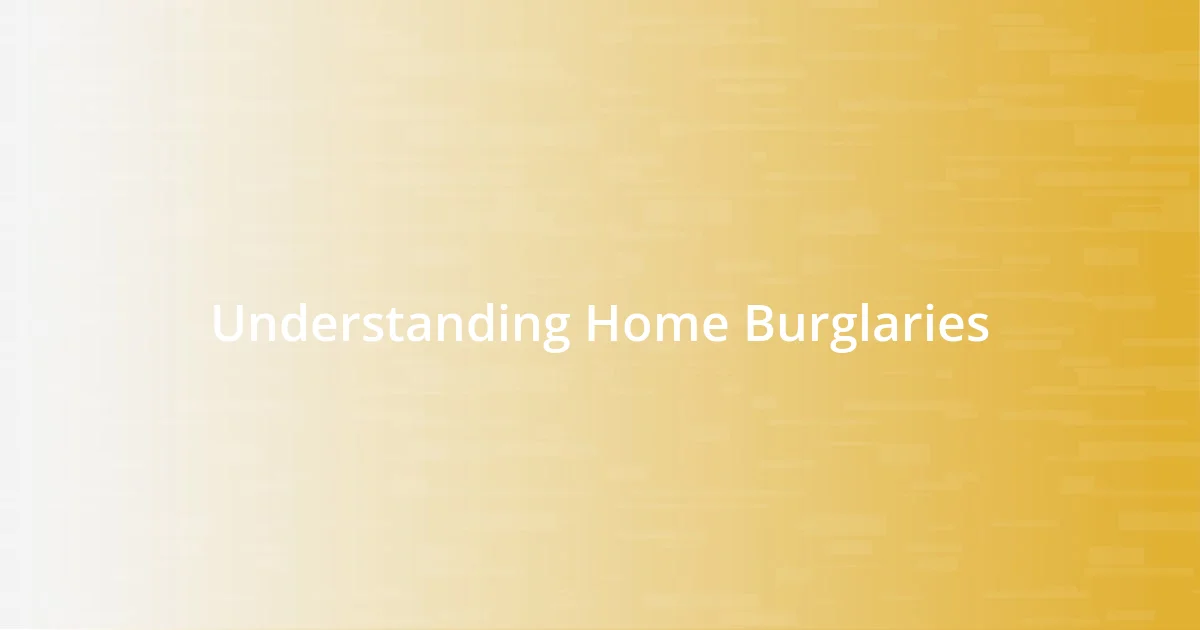
Understanding Home Burglaries
Home burglaries can feel incredibly invasive and violating; it’s like someone has stomped into your sanctuary. I remember a friend of mine who came home after a long vacation to find her front door ajar. The horror in her eyes as she processed that someone had rummaged through her personal belongings is a feeling that stays with me. How would you feel if someone had that complete disregard for your space?
Understanding why burglaries happen helps in grasping the gravity of the situation. Many times, criminals target homes that appear vacant or uninviting, thinking they can slip in and out unnoticed. I often think about how simple things, like leaving lights on or having a neighbor check in, could deter such unwanted attention. Isn’t it unsettling to consider that we have the power to make our homes less appealing to these intruders simply by being a bit proactive?
It’s also essential to recognize that burglaries aren’t just about stealing possessions; they can also steal your peace of mind. I’ve spoken to countless individuals who felt violated long after the incident, as if a shadow had been cast over their once-comfortable lives. Wouldn’t it be comforting to feel that you’re taking steps to protect your sanctuary, and in turn, your emotional well-being?
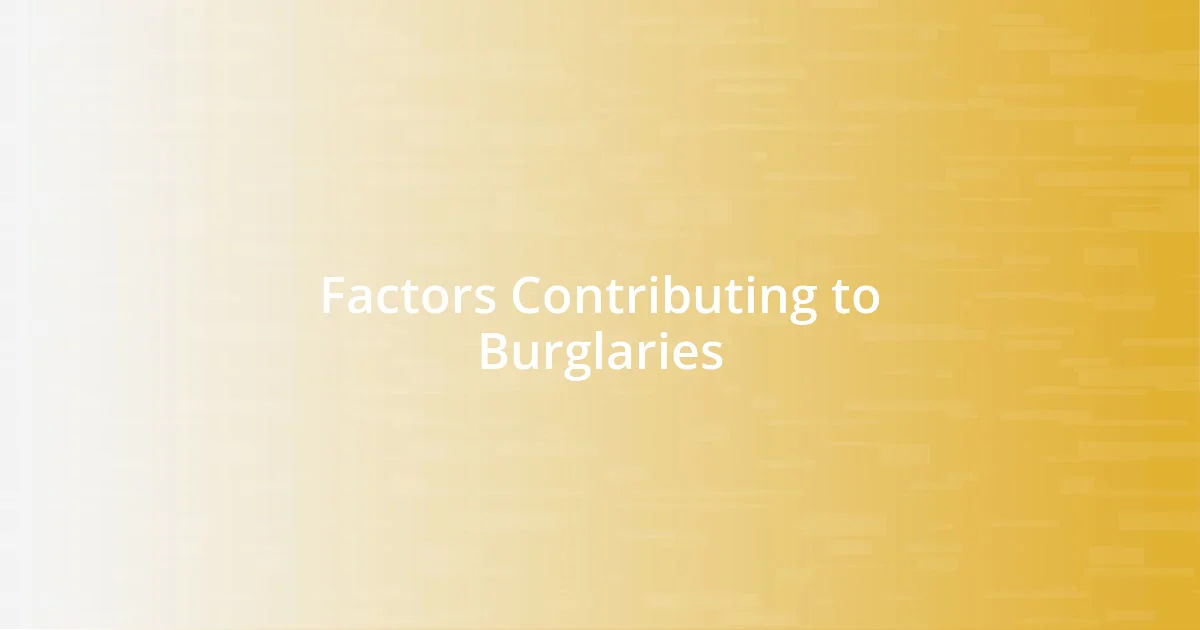
Factors Contributing to Burglaries
When I reflect on the factors contributing to burglaries, one striking element is the perceived vulnerability of a home. For instance, I once visited a neighbor’s house that had overgrown shrubs obscuring the windows. It struck me how inviting that environment felt for a potential burglar. Those moments of realization made me understand the importance of maintaining a well-kept yard—it’s not just about aesthetics but also about deterrence.
Another major factor is the absence of security systems. I recall a family who lived down the street from me; they had a basic alarm system but never used it, believing it wouldn’t happen to them. Sadly, they experienced a break-in that left them feeling utterly violated. Their sense of security evaporated overnight, reminding me that proactive measures, like installing an efficient security system, can significantly reduce the likelihood of a burglary.
Lastly, social dynamics play a crucial role. Homes in neighborhoods with tight-knit communities tend to be safer. I personally experienced this when I moved into a new area; the warmth and watchfulness of my neighbors made me feel secure. I realized that simply knowing someone is looking out for you can be one of the strongest deterrents against crime. Isn’t it amazing how our connections can fortify our defenses against threats?
| Factor | Description |
|---|---|
| Vulnerability of Home | A home that appears unkempt or empty is more likely to attract burglars. |
| Lack of Security Systems | Homes without alarms or monitoring systems are at greater risk of break-ins. |
| Community Awareness | A strong neighborhood watch can effectively deter criminal activity. |
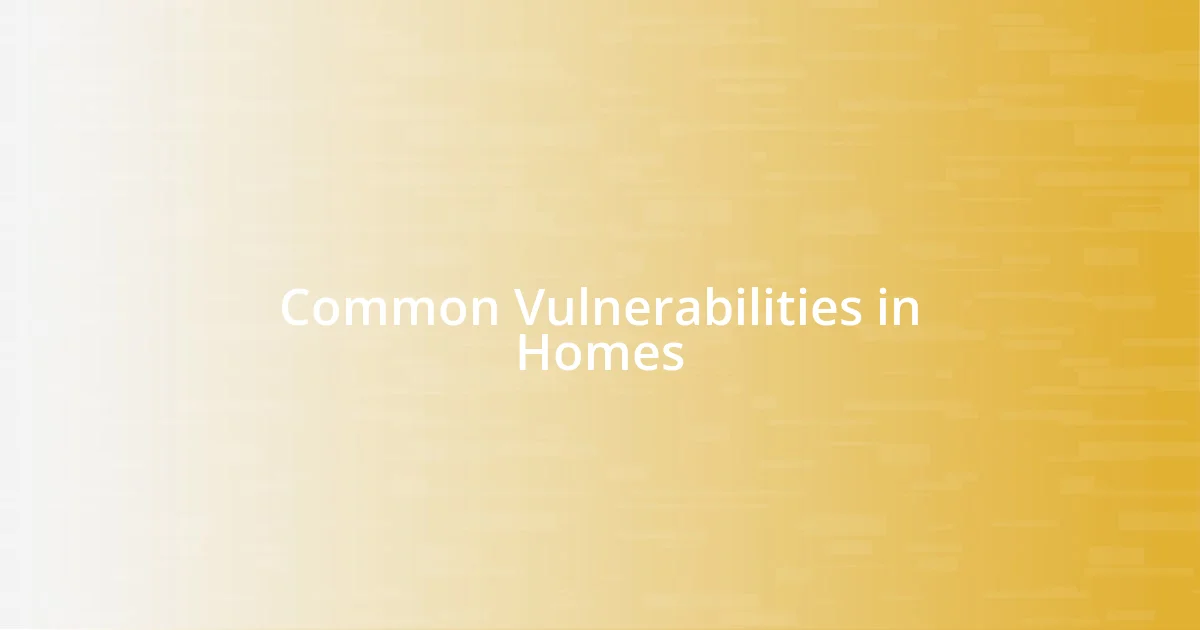
Common Vulnerabilities in Homes
When I think about common vulnerabilities in homes, one glaring issue stands out: accessibility. I vividly recall an instance when I visited a friend’s apartment. She had a sliding door that was left unlocked simply because it was “convenient.” This oversight made it alarmingly easy for an intruder to enter. There is something deeply unsettling about realizing how a small lapse in security can open the door to danger within one’s personal space.
Another vulnerability often overlooked is the presence of valuable items displayed in clear view. I remember a time when I went to a local cafe and noticed how the laptops and phones on tables drew my attention more than the decor. It struck me then that homes with visible electronics—like televisions or gaming consoles—can unintentionally become targets. Here are some vulnerabilities to keep in mind:
- Unlocked Doors and Windows: Leaving entry points unsecured is an open invitation for burglars.
- Visible Valuables: Prized possessions left in sight can entice criminals to break in.
- Poor Lighting: Dark corners around a home provide cover for intruders, increasing the likelihood of unnoticed entry.
Being aware of these vulnerabilities can lead to practical changes that safeguard your home and enhance your overall peace of mind.
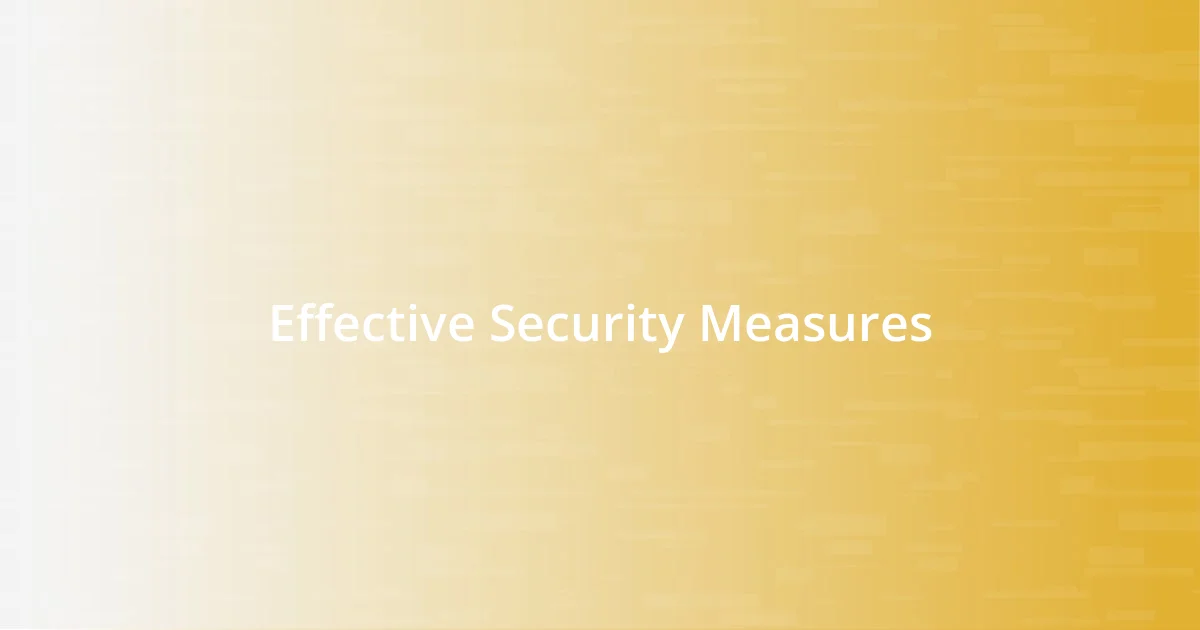
Effective Security Measures
One of the most effective security measures I like to advocate is the installation of smart home technology. For instance, when I decided to upgrade my security system, I was amazed by how intuitive smart cameras can be. I can check in on my home directly from my phone, no matter where I am. This added layer of oversight not only provides peace of mind but also allows me to respond quickly to any potential issues. Isn’t it comforting to think that technology can act as a vigilant friend, always watching over your space?
I’ve also learned that physical barriers, like robust locks and security doors, are essential. I can still remember the time when I visited a friend’s home that had reinforced doors and high-quality deadbolts. It gave me an immediate sense of security; I felt protected just standing there. I’ve since taken the added step of adding motion-sensor lights outside my house, which casts a bright beam into the dark. The shift in atmosphere is palpable—those lights not only illuminate the paths but also let any would-be intruder know they’re being watched. What measures can you implement to enhance your home’s defenses?
Community collaboration is another game-changer. In my neighborhood, we’ve established a Facebook group where residents can quickly share information about suspicious activity. I remember a recent incident where an attempted break-in was reported. Thanks to our active communication, we rallied to keep an extra eye on each other’s properties. It’s wonderful to see how such simple connections can boost our collective security. Isn’t it interesting how safety isn’t just an individual endeavor, but rather a community effort that encourages everyone to be protective?
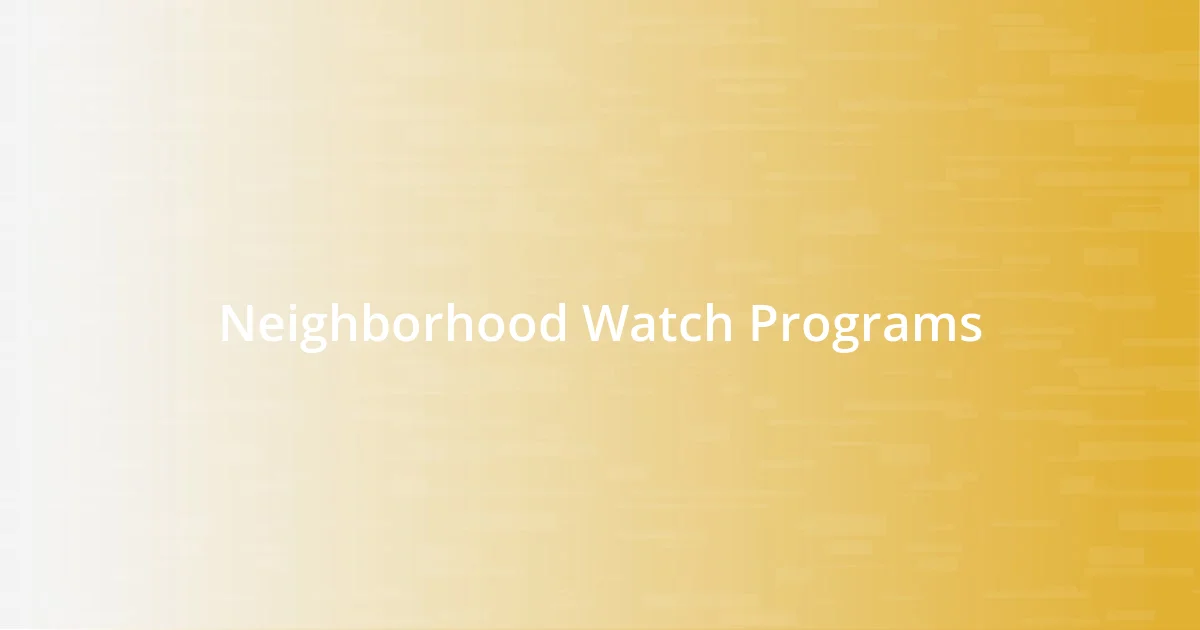
Neighborhood Watch Programs
Engaging in a Neighborhood Watch Program can truly transform the feeling of safety in a community. In my own experience, I’ve seen firsthand how neighbors coming together fosters a sense of vigilance and trust. When our local group organized regular meetings, I was surprised by how much I learned about our area—things I had never noticed before. It’s like putting on a new pair of glasses; suddenly, the details stand out, and the community feels connected in a way that enhances our security.
Sometimes, it only takes one observant neighbor to make a difference. A friend of mine shared a story where a suspicious vehicle was spotted near several homes on our street. Thanks to our neighborhood watch, someone called the police right away, and they arrived just in time. I think about how that swift action prevented what could have been a serious incident. Isn’t it encouraging to think that we can rely on one another in times of uncertainty?
Moreover, the friendships I’ve formed through participation have made me feel more grounded in my community. These connections help create a more proactive atmosphere where residents look out for each other. I often reflect on how just a simple hello or a chat with a neighbor can inspire lines of communication that lead to a more secure environment for everyone involved. Have you thought about how your community could benefit from a collective security effort? The benefits extend beyond just safety—they can nurture a stronger sense of community, too.

Importance of Home Insurance
Home insurance is one of those crucial safety nets that often gets overlooked until it’s too late. I’ve had a friend who experienced a break-in, and while the physical loss was hard to stomach, the financial burden of replacing everything without insurance was far worse. That experience opened my eyes to how vital it is to have a policy in place; it’s not just about protecting your belongings, it’s about peace of mind during stressful times.
From my perspective, having comprehensive home insurance allows me to sleep soundly at night. After all, knowing that my home and valuables are covered gives me a sense of security that’s hard to quantify. I once attended a seminar where the speaker highlighted stories of homeowners who were saved from financial ruin because of their insurance—each story drove home the importance of being prepared for the unexpected. Have you considered how your own life would be impacted if disaster struck?
I remember my own process of determining the right coverage options—it felt overwhelming at first. I broke it down into manageable pieces, researching different providers, and eventually found a policy that suited my needs. It’s such a relief to have that safety net now. Taking the time to assess your home and choose the appropriate insurance can protect not just your assets but also your emotional well-being. Isn’t it worth that time and effort for the security it brings?
